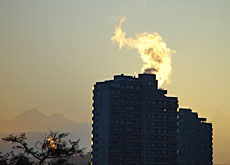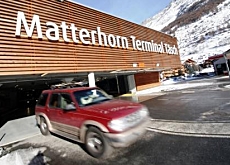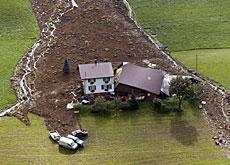CO2 tax to put Swiss on Kyoto target

Switzerland will introduce a tax on carbon dioxide emissions from January 1, 2008 to meet its Kyoto objectives, the government said on Thursday.
The tax will be applied to all imported fossil fuels, amounting to around three centimes on each litre of heating oil and 2.5 centimes on a cubic metre of gas.
According to a deal agreed by the cabinet and parliament earlier this year, the CO2 tax becomes mandatory in 2008 since Switzerland failed to reach its own emissions reduction target for 2006.
It had pledged to cut last year’s emissions by at least six per cent compared with 1990 levels, but only managed 4.5 per cent.
The Federal Environment Office said emissions did go down between 2005 and 2006 but the mild winter in Switzerland should have led to a greater reduction.
The six per cent cut was seen as necessary for Switzerland to meet its commitments under the Kyoto Protocol, which calls for an eight per cent reduction by 2012 in order to combat climate change.
The tax will be increased in stages in 2009 and 2010 if emission levels do not come down to satisfactory levels.
The ministry said the new levy was an incentive more than a tax, since it would encourage industry and the public to use fossil fuels more efficiently and trigger investment in renewable energies.
Doubts
However, the Swiss Petroleum Association rejected the notion, doubting the government’s claim that the tax would reduce CO2 emissions by 700,000 tons a year.
The association said sales of heating oil would actually increase over the coming months as buyers rush to fill their tanks before the levy comes into effect.
The Swiss Property Owners Association is also opposed to the tax since it believes it discriminates against heating oil users. It called the government’s decision “political arbitrariness” and said it would add SFr100 ($81) to the annual heating bill of each homeowner.
Annual proceeds of the tax are supposed to be redistributed to families and the economy through a benefit system.
This is welcomed by the association representing people who live in rental properties. A majority of Swiss live this kind of accommodation.
The association said the tax was an incentive for people to save with the tax income returning indirectly to consumers.
Companies can be exempted from the tax if they sign a binding agreement with the government to cut their own emissions. Around 600 firms have already done so.
The CO2 tax follows on from the so-called “climate cent”, a legally non-binding charge already levied on petrol and diesel imports at a rate of 1.5 centimes per litre.
At last year’s international climate conference in Nairobi, Swiss Environment Minister Moritz Leuenberger called for the introduction of a global CO2 tax.
swissinfo with agencies
The Kyoto Protocol, an amendment to the UN Convention on Climate Change, was approved in 1997 and came into force in 2005. It has been ratified by industrialised countries – apart from the United States and Australia – and by a large number of developing countries.
It calls for industrialised nations to reduce harmful emissions by an average of 5.2% below 1990 levels by 2012.
Switzerland’s CO2 law formally came into effect in 2000. Its objective is to reduce emissions of CO2 arising from fossil fuels by 10% from 1990 levels by 2010. The desired reduction should be achieved by voluntary measures, but if they are not adequate, the government can introduce a disincentive tax on fossil energy.
On November 8 the government declared that Switzerland had met its formal requirements under the Kyoto Protocol so that it would reduce its greenhouse gases by 8% below the 1990 level – or a maximum of 242.85 million tons of CO2 – between 2008 and 2012.
Carbon dioxide (CO2) is one of the major gases responsible for greenhouse effect and global warming. In Switzerland it represents around 80% of harmful emissions.
The other gases include methane, nitrous oxide and hydrocarbons.
Despite ambitious emission targets, greenhouse gas emissions have actually risen by 0.4% in Switzerland since 1990.

In compliance with the JTI standards
More: SWI swissinfo.ch certified by the Journalism Trust Initiative



You can find an overview of ongoing debates with our journalists here. Please join us!
If you want to start a conversation about a topic raised in this article or want to report factual errors, email us at english@swissinfo.ch.